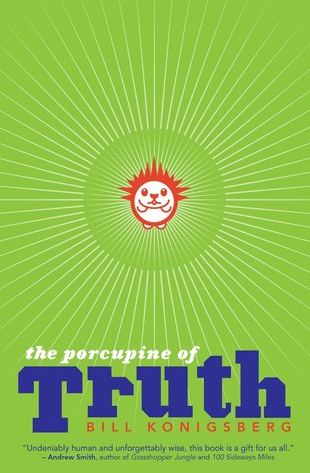

“Some things you remember, and some you forget. Of the things you remember, you have to wonder what’s real and what’s translated into a memory from a story you heard.”
― Bill Konigsberg, quote from The Porcupine of Truth
“I really don’t worry about that anymore. When you’re dying, you don’t have time for that junk. The shit people did to you? It’s over.”
― Bill Konigsberg, quote from The Porcupine of Truth
“And I think, What’s the opposite of suffocation?”
― Bill Konigsberg, quote from The Porcupine of Truth
“It’s hard to explain,” she says. “I would say that I’m more spiritual than religious at this point.” “What does that even mean?” I stare upward at the gleaming stars. “To me, religion is the Walmart of spirituality.”
― Bill Konigsberg, quote from The Porcupine of Truth
“More and more these days, I'm realizing that I might be crazy, but I'm loved too. I don't think I ever really knew that before, but I do now.”
― Bill Konigsberg, quote from The Porcupine of Truth

“I worry sometimes that our world actually values a lack of intelligence. Like we are considered normal if we spend our time thinking about what one of the Kardashians wears to a party, and we are considered strange if we wonder whether a bee’s parents grieve if said bee dives into the Central Park Reservoir and never makes it back to the hive.”
― Bill Konigsberg, quote from The Porcupine of Truth
“Maybe in life, most of us feel inferior because we compare our dress rehearsals to [Janelle Monae’s] final performance. --page 113”
― Bill Konigsberg, quote from The Porcupine of Truth
“Sitting in a church makes you no more of a Christ follower than sitting in a Ford dealership makes you a Mustang owner.” I”
― Bill Konigsberg, quote from The Porcupine of Truth
“Los guaraos, que habitan los suburbios del Paraíso Terrenal, llaman al arcoiris "serpiente de collares" y "mar de arriba" al firmamento.
El rayo es "el resplandor de la lluvia".
El amigo, "mi otro corazón".
El alma, "El sol del pecho"
La lechuza, "el amo de la noche oscura."
Para decir bastón dicen "nieto continuo";
Y para decir perdono, dicen "olvido".”
― Eduardo Galeano, quote from Genesis
“It takes far less courage to cling to the past than it does to face the future".”
― Sandra Brown, quote from Envy
“The thing to remember when you're writing," he said, " is, it's not whether or not what you put on paper is true. It's whether it wakes a truth in your reader. I don't care what literary device you might use, or belief systems you tap into--if you can make a story true for the reader, if you can give them a glimpse into another way of seeing the world, or another way that they can cope with their problems, then that story is a succes.”
― Charles de Lint, quote from The Blue Girl
“Rules are made for people, not people for rules,”
― Madeleine L'Engle, quote from The Arm of the Starfish
“It shattered something inside me that hadn't been broken before.”
― E. Lockhart, quote from The Boyfriend List: 15 Guys, 11 Shrink Appointments, 4 Ceramic Frogs and Me, Ruby Oliver
BookQuoters is a community of passionate readers who enjoy sharing the most meaningful, memorable and interesting quotes from great books. As the world communicates more and more via texts, memes and sound bytes, short but profound quotes from books have become more relevant and important. For some of us a quote becomes a mantra, a goal or a philosophy by which we live. For all of us, quotes are a great way to remember a book and to carry with us the author’s best ideas.
We thoughtfully gather quotes from our favorite books, both classic and current, and choose the ones that are most thought-provoking. Each quote represents a book that is interesting, well written and has potential to enhance the reader’s life. We also accept submissions from our visitors and will select the quotes we feel are most appealing to the BookQuoters community.
Founded in 2023, BookQuoters has quickly become a large and vibrant community of people who share an affinity for books. Books are seen by some as a throwback to a previous world; conversely, gleaning the main ideas of a book via a quote or a quick summary is typical of the Information Age but is a habit disdained by some diehard readers. We feel that we have the best of both worlds at BookQuoters; we read books cover-to-cover but offer you some of the highlights. We hope you’ll join us.